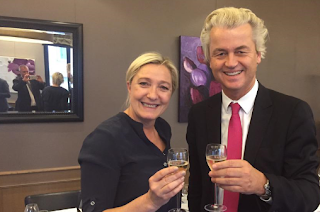L’extreme droit a formé
un autre parti fédéral. The anti-E.U. party officially announced on June
16, 2015, is named “Europe of Nations and Freedoms.” A label can say a lot
about a party’s principles. In this case, the overriding point is that the E.U.
is supranational. That is to say, the
Union is an international organization. Closely behind is the secondary point
that freedom resides at the national level, otherwise known as the level of the
states. Even though the supporting state parties were at the time typically
labeled as extreme—the extreme right—the main-stream media in the E.U.
reporting on the new party used rhetoric subtly undergirding the principles.
Le Pen and Wilders toasting their new ethnic group in the European Parliament.
(Source: Geert Wilders)
(Source: Geert Wilders)
Deutsche Welle, for example, repeatedly refers to the new
party as a “group in the European Parliament.”[1]
Governments, after all, have parties, and the E.U.’s “assembly” can hardly be
considered a legislature—so goes the party-line. Accordingly, the PVV’s Geert
Wilders tweeted, “The formation of a group in the European Parliament has
succeeded!”[2]
Le Pen’s FN put out a statement referring to “a political grouping . . . within
the EU assembly.”[3]
Both “grouping” and “assembly” intimate an international forum rather than a
legislative body whose representatives are elected by citizens directly rather than
appointed by states and representing them.
That “Euroskeptic and right-wing parties came out top in the
European Parliament elections in May 2014” is to say that the national parties did well. The reference
is not to the parties in the Parliament. “In France,” for example, Deutsche
Welle reports that “FN garnered more votes than any other party.”[4]
The night before the announcement of the new “grouping” in the Parliament,
Florian Philippot, vice president of the FN, told Reuters, “We were five and it’s
been possible to add two other nationalities to form a group.”[5]
Clearly, he was not referring to an ethnically-diverse group of people. The
linguistic stretch alone belies the veracity of the rhetoric and its underlying
principles.
Imagine the confusion were a new party formed in the U.S.
House of Representatives with members from seven states and the rhetoric were
similar to that being applied to the chamber’s counterpart in the E.U. A
headline such as, “Seven ethnicities have formed a group in the House of
Representatives,” would naturally be taken as referring to the Congressional
Black Caucus joining forces with other such groups
in the House. Of course, race is distinct from ethnicity, but distortive
rhetoric in American politics is not the point of this essay. Rather, my point
is that a new party in the European Parliament is not somehow akin to the
Congressional Black Caucus.
Moreover, a recognized party in a legislative body is not “a
grouping.” Nor is the European Parliament an international assembly, for states
(a.k.a. nations in the European context) are not represented. Ironically, the
word “Congress” comes from the French, le
congrès, which can mean “conference”—as in an international conference. The
Continental Congress, which was the federal
institution from 1776-1781 in the U.S., was indeed a conference, as the thirteen
sovereign nations sent delegates to
represent those states at a level viewed at the time as international rather
than national. It would be une erreur formidable to imply that the
E.U. states were still sovereign states at the time of the new party’s announcement,
and thus that the E.U. was somehow an international organization with
legislative groupings rather than parties.
2. Ibid.
3. Ibid.
4. Ibid.
5. Ibid.

